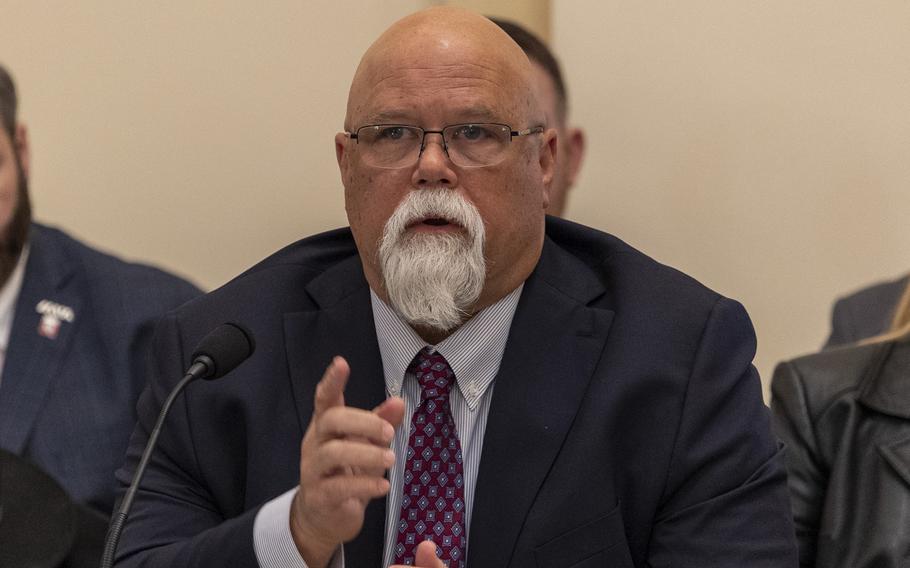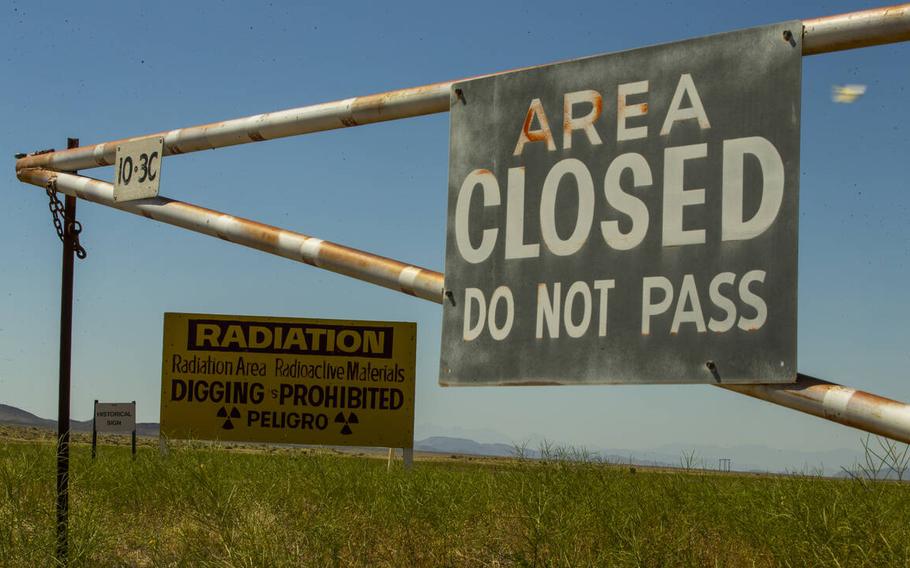
David Crete, chairman of The Invisible Enemy, speaks Tuesday, April 8, 2025, during a round table discussion hosted by Democratic Sen. Richard Blumenthal, D-Conn., and Rep. Mark Takano, D-Calif., on toxic exposures at U.S. military bases in Washington. (Eric Kayne/Stars and Stripes)
(Tribune News Service) — Dave Crete and other Nevada veterans who served at the Nevada Test and Training Range have long experienced a slew of health problems, from fatty tumors called lipomas to decreased lung function — and for many, cancer cases that have led to death.
Despite their service, those veterans have been unable to receive veterans benefits to cover those medical costs because their work was classified. A new bill aims to change that.
Nevada’s Democratic Sens. Jacky Rosen and Catherine Cortez Masto on Wednesday introduced the Fighting for the Overlooked Recognition of Groups Operating in Toxic Test Environments in Nevada (FORGOTTEN) Veterans Act that would officially recognize the risk veterans assumed during their services.
“This is our path to being able to get our veterans benefits,” Crete said. “This bill, this work that Congress is doing, is what’s going to give us a path to being able to get what we need.”
A long fight for compensation
Crete has fought for legislation since 2023 when he formed the organization The Invisible Enemy. Several years prior, he reunited with his fellow veterans and learned that they all had similar health problems. They chalked it up to their service at the Nevada Test and Training Range, where they say they were exposed to chemicals and radioactive materials.
Between the 1950s and 1990s, more than 900 nuclear weapons tests and other dangerous toxic activities occurred on the 2.9 million acre Nevada Test and Training Range, and the Nevada Test Site contained within it, according to Rosen’s office.
Both the activities — and the people who worked there — were classified and considered top secret by the Department of Defense. Compensating veterans for their medical bills would require acknowledging they were there in the first place, Crete had said in 2023.
Rosen and Cortez Masto’s FORGOTTEN Veterans Act would classify the Nevada Test and Training Range as contaminated and require the Department of Defense to document all exposures into servicemembers’ records so they can be seen by the VA when receiving care.
“Veterans have been exposed to radiation and toxic chemicals as a result of their selfless service to our nation, and the least we can do is ensure they get the treatment they need,” Rosen said in a statement.
The bill would establish a presumption of toxic exposure for veterans who served at the test and training range in order to decrease the burden of proof in VA claims, according to Rosen’s office. It also will require the Secretary of the Air Force to identify all those who served at the Nevada Test and Training Range since 1951 and establish a process for veterans to provide proof of their assignment within the training range.
“As a nation, it is our obligation to take care of all veterans once their service has ended,” Cortez Masto said in a statement. “This is especially true for veterans of the Nevada Test and Training Range, who faced toxic exposure daily as part of their duties and should have parity with their civilian counterparts.”

Caution signs near the rim of the Sedan crater excavation experiment, which detonated on July 6, 1962, within the Nevada National Security Test Site, where the Apollo 11 astronauts trained for several days in preparation for their moon mission Thursday, June 20, 2019, in Mercury, Nevada. (L.E. Baskow/Las Vegas Review-Journal via TNS)
Department of Energy employees already have a presumption of exposure and are covered under the Division of Energy Employees Occupational Illness Compensation Program Act, but Department of Defense personnel who served at Department of Energy covered facilities are not, including facilities in the Nevada Test and Training Range like the Tonopah Test Range where Crete served.
“It is unconscionable that one U.S. government agency deems portions of the range as contaminated and their personnel exposed, while another U.S. government agency does not,” Rosen said in a statement. “I’ll continue working to make sure we take care of our veterans and their loved ones.”
Multiple legislative efforts
Wednesday’s bill is one of a couple of different legislative efforts on the table to ensure the veterans receive their benefits.
In September 2024, Rep. Mark Amodei, R-Nev., and Rep. Susie Lee, D-Nev., introduced the PROTECT Act that would establish a presumption that veterans were exposed to radiation beginning in 1972 at the Nevada Test and Training Range. They reintroduced that bill in February 2025.
There are also discussions to include a measure in the National Defense Authorization Act, Crete said.
“Everything’s getting better and better and looking more and more promising,” he said. “We’re getting less resistance than we were before. Pretty much everybody we talk to is now supportive on both sides.”
Another goal is to ensure widows of the veterans receive survivor benefits, Crete said. Spouses of veterans at the Nevada Test and Training Range don’t receive benefits when their partners die, though families of veterans anywhere else do, he said.
“We’re not trying to get something different than anybody else gets,” Crete said. “We’re just trying to get the same benefit that is available to everybody else. When you join the military, they tell you that, ‘Hey, if something happens to you, you’re eligible for veterans benefits. There are benefits there to help you in case something bad happens.’”
©2025 Las Vegas Review-Journal.
Visit reviewjournal.com.
Distributed by Tribune Content Agency, LLC.